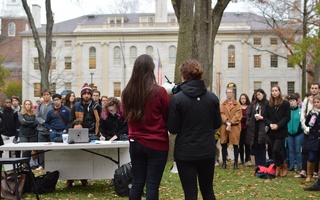UPDATED: March 1, 2018 at 7:18 a.m.
Panelists shared personal stories, advice, and a range of historical experiences related to sexual violence at Harvard at an event Tuesday afternoon co-hosted by Our Harvard Can Do Better and the Radcliffe Union of Students.
The second event of the 2018 Women’s Week, the panel featured Law School Professor Diane L. Rosenfeld, Shane Snowdon ’78, Emily Fox-Penner ’17, and Crimson magazine chair Marella A. Gayla ’19.
Snowdon discussed Harvard in the 70s, while Fox-Penner highlighted the more recent work of Our Harvard Can Do Better, a group which advocates for an end to sexual violence at Harvard, with a focus on Title IX policies and enforcement at the College.
Snowdon said the use and interpretation of Title IX has drastically changed over past decades, adapting from a focus on equal opportunity in athletics to issues including gender violence.
“It was not until the early 80s that Title IX was remotely considered to be something that could be used in relation to gender violence. Title IX was considered only in the context of athletics, and it had a very weak effect on athletics,” Snowden said.
Gayla, who has written about the history of sexual violence at Harvard for The Crimson, also noted the change, particularly in the language used when discussing sexual assault and rape. For the article, she interviewed alumni who graduated from Harvard or Radcliffe in between the 60s and the 80s.
“When I was pretty early in the reporting process, I had a number of calls that felt like duds for me because I would say “What about Title IX?” and they would just say “Oh, I wasn’t an athlete,’” Gayla said.
Gayla said after speaking with Title IX coordinator Emily J. Miller, she realized she was using the wrong language in her questions.
“I found that the language we use to talk about sexual violence changes so much generationally,” Gayla said.
Snowden said in the 70s, there was not much institutional support at the University for undergraduate women who advocated against gender violence and harassment and they sometimes had to meet in secret.
“We did not dream of an institutional response. It took us months even to get a meeting with the head of campus police,” she said. “We knew that whenever a woman went to campus or local police, the first questions, because this is the 70s, were ‘What were you wearing? What were you doing there? What were you doing there then?’ We knew about that and that all we had was each other.”
Rosenfeld offered advice on activism for current students, encouraging them to demand an audience with the administration, especially with University President-elect Lawrence S. Bacow.
“There is absolutely power in numbers. Gather your student groups and have meetings and meetings and meetings with the new President, even before he takes office. Let him know that you need to be on his radar,” Rosenfeld said.
Amelia Y. Goldberg ’19, an active member of Our Harvard Can Do Better, moderated Tuesday’s panel and urged students to stand up for what they believe in.
“Students have had and continue to have an incredible power to organize for change,” Goldberg said.
—Staff writer Paula M. Barberi can be reached at paula.barberi@thecrimson.com. Follow her on Twitter @paulambarberi.
Read more in News
College Working to Debut Gender-Neutral Housing for FreshmenRecommended Articles
-
Title IX Office Launches New WebsiteThe central Title IX office's new website provides information about Title IX policies and procedures, continuing a push to better inform students, faculty, and staff.
-
 Title IX Officer Mia Karvonides to Leave Harvard
Title IX Officer Mia Karvonides to Leave Harvard -
 Title IX Activists Prepare Statement on DeVos’s Confirmation
Title IX Activists Prepare Statement on DeVos’s Confirmation -
Our Harvard Can Do Better Discusses Sexual Assault On Campus“We’re gonna be pushing for a lot of demands that we’ve been quite vocal about in the past,” Amelia Y. Goldberg ’19, a member of the group, said.
-
Why We Need Title IXTitle IX has given survivors a voice, and Harvard is listening, but without proper enforcement, students who experience sexual violence will no longer be given the time and support they need to heal and continue their educations.













